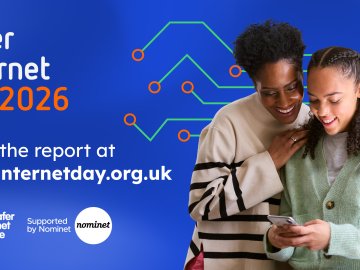Across the UK, thousands of people continue to experience one of the most pervasive and distressing forms of online abuse: the sharing and re-sharing of non-consensual intimate images (NCII). Despite recent progress in strengthening criminal offences, individuals still face a battle that can feel endless. One image uploaded without consent can spread across adult sites, anonymous forums, social platforms, and private devices in a matter of hours. But long after the initial upload is removed, copies can resurface again and again, sometimes for years.
Through the Revenge Porn Helpline and StopNCII.org, we see this reality every day. Survivors are not asking for special treatment, they are asking for a system that works. They need the law to ensure illegal content is taken down quickly, kept offline, and prevented from reappearing. Right now, the UK does not provide that protection.
This is why we are strongly supporting the proposed amendments to the Crime and Policing Bill tabled by Baroness Owen. Her proposals offer a practical, privacy-preserving, survivor-centred solution to the most significant practical and legislative gaps that remain.
A System Designed to Break the Cycle of Re-Uploads
Although the law now clearly criminalises the sharing or threatening to share intimate images without consent, enforcement is still a patchwork operation. Survivors must contact platforms one by one, reporting each copy individually and relying on inconsistent policies and moderation systems. Meanwhile, perpetrators may hold countless versions on their own devices or cloud accounts, ready to circulate again.
Baroness Owen’s amendments introduce a clear, time-bound takedown requirement so that when someone reasonably believes they are a victim of intimate image abuse, platforms have a legal obligation to act within 48 hours. This marks a significant shift from the current system, which too often leaves victims waiting days or even weeks for platforms to respond. The amendments also anticipate the need for fair safeguards, including sanctions for malicious reporting and a review process after the initial takedown window. Crucially, platforms would not simply be obliged to remove a single link, they would be required to prevent duplicates of the same content from remaining online.
Ensuring Offenders Cannot Continue the Abuse
The amendments also address a longstanding challenge: how to stop perpetrators retaining illegal images on their devices. Under Baroness Owen’s proposals, courts would be required to order the destruction of any devices or data stores containing NCII upon conviction, compel offenders to disclose relevant passwords, and ensure verified deletion from cloud accounts. This creates a direct, enforceable duty to eliminate the content at its source, rather than leaving survivors to live with the fear that an offender still holds intimate material that could be shared again.
Using Technology to Prevent Re-Uploading
Central to the amendments is a requirement for the Government to put in place a regulated framework for hashing, a privacy-preserving technology that allows platforms to identify and block specific images without storing or sharing the images themselves. It is the approach we developed with StopNCII.org, which already enables anyone over the age of 18 to create secure image hashes that platforms can use to prevent re-uploads.
The amendments recognise this emerging international standard and require the Secretary of State to create a lawful, safeguarded system for hashing NCII. In doing so, they take the most effective technical tool we have and embed it within a statutory framework.
A Statutory NCII Register
Perhaps the most transformative part of the proposals is the creation of a statutory NCII Register. For the first time, the UK would have an authoritative, regulated source of verified NCII hashes that platforms and internet service providers must use to block access and prevent further distribution. This would bring adult NCII protection closer to the systemic model, used successfully for child sexual abuse material, while maintaining the necessary safeguards around consent, privacy and proportionality.
Crucially, the Register would contain only hashes (digital fingerprints) not the images themselves. Survivors could choose to have their images hashed and added to the Register through a trusted, survivor-led process, while courts could add material connected to convictions as “confirmed NCII”. Ofcom or another regulator would oversee accuracy, governance and access, ensuring strong checks, balances and accountability.
This would finally provide the infrastructure that survivors have been asking for: a system capable not only of taking NCII content down but also keeping it down.
A Survivor-Centred Approach
While some may worry about privacy, scope or overreach, the amendments have been drafted specifically with these concerns in mind. They require sanctions for malicious reporting, robust governance standards, and a privacy-by-design model that mirrors existing independent systems rather than any form of centralised image storage. In practice, this looks like StopNCII.org.
The proposals are proportionate, targeted, and deeply rooted in consent. Adult intimate images are not illegal in themselves; what is illegal is the breach of consent. The amendments reflect that distinction by requiring verification from victims or confirmation from the courts before material enters the Register. This ensures a high standard of protection for individual rights while addressing a clearly defined and growing form of abuse.
A Chance for the UK to Lead
The UK has long led the world in protecting children from online sexual abuse through coordinated, innovative systems. With Baroness Owen’s amendments, Parliament now has the opportunity to lead again, this time in protecting adults who have been subjected to intimate image abuse. The combination of fast takedown, verified deletion, regulated hashing and a statutory NCII Register creates a coherent, workable system that aligns with existing law and emerging global practice.
Survivors have lived for too long with the relentless anxiety that their images could resurface at any moment. By adopting these amendments, Parliament can create the infrastructure needed to bring that cycle to an end, offering survivors the certainty and protection they deserve.
SWGfL strongly urges Peers to support these amendments and to press the Government for clear commitments on implementing hashing, developing the NCII Register, and consulting directly with survivors and frontline services. With these steps, the UK can finally move from ad hoc response to systemic protection, ensuring that when survivors ask for illegal intimate content to be taken down, it stays down.
*This photo is permitted to use under an Attribution 3.0 Unported (CC BY 3.0) licence.






